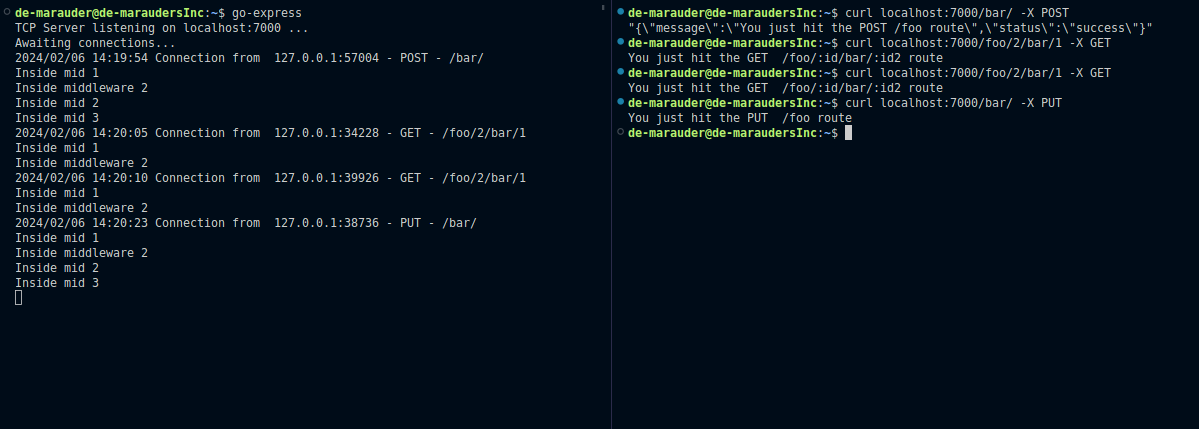This repo contains an implementation of an HTTP web-server build from scratch (tcp) copying ExpressJS style. If comes with a TCP client that can send HTTP requests to the server
- Request Logging
- Middleware handling: handlers for middlewares can be registered for route groups
- Router: Can scope functionalities like middlewares based on routes
- Routing: can parse route tokens (params) and query params from raw HTTP requests
- JSON parsing: Can serialize response body (go structures) to stringified form for streaming over TCP and also deserialize request body to go structures
- TCP Connection concurrency
Please check here for a full example
// main.go
package main
import (
"fmt"
"github.com/de-marauder/go-express/server/server"
)
const (
host = "localhost"
port = "7000"
)
func main() {
s := server.NewHTTPServer()
// register handlers with param tokens and HTTP methods
s.Get("/", handleRootRoute)
s.Get("/foo/:id/bar/:id2", handleOneFooBarByIdRoute)
s.Get("/foo/:id/bar", handleOneFooBarRoute)
s.Get("/foo/:id", handleOneFooRoute)
s.Get("/foo", handleFooRoute)
s.Post("/foo", handlePostFooRoute)
s.Put("/foo", handleFooRoute)
s.Listen(host+":"+port, func () {
// Add some string outputs or
// run some jobs after server starts
fmt.Println("Awaiting connections...")
})
}
// Define handlers //
func handleRootRoute(req *server.HTTPRequest, res *server.HTTPResponse) interface{} {
res.StatusCode = 200
// send response using res.Send()
res.Send("You just hit the " + req.Method + " /foo route")
return 1
}
func handleOneFooBarByIdRoute(req *server.HTTPRequest, res *server.HTTPResponse) interface{} {
fmt.Println(req.Params)
res.StatusCode = 200
res.Send("You just hit the " + req.Method + " /foo/:id/bar/:id2 route")
return 1
}
func handleOneFooBarRoute(req *server.HTTPRequest, res *server.HTTPResponse) interface{} {
fmt.Println(req.Params)
res.StatusCode = 200
res.Send("You just hit the " + req.Method + " /foo/:id/bar route")
return 1
}
func handleOneFooRoute(req *server.HTTPRequest, res *server.HTTPResponse) interface{} {
fmt.Println(req.Params)
res.StatusCode = 200
res.Send("You just hit the " + req.Method + " /foo/:id route")
return 1
}
func handleFooRoute(req *server.HTTPRequest, res *server.HTTPResponse) interface{} {
res.StatusCode = 200
res.Send("You just hit the " + req.Method + " /foo route")
return 1
}
// Handle JSON response using res.Json
func handlePostFooRoute(req *server.HTTPRequest, res *server.HTTPResponse) interface{} {
res.StatusCode = 200
type JsonMap map[string]string
data := make(JsonMap)
data["message"] = "You just hit the " + req.Method + " /foo route"
data["status"] = "success"
res.Json(data)
return 1
}
func handlePutFooRoute(req *server.HTTPRequest, res *server.HTTPResponse) interface{} {
res.StatusCode = 200
res.Send("You just hit the " + req.Method + " /foo route")
return 1
}go mod init
go mod tidy
go run main.go